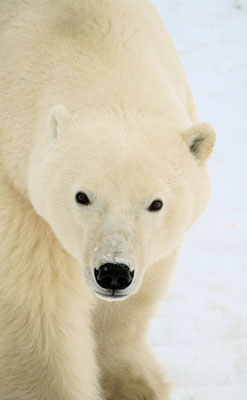All Nonfiction
- Bullying
- Books
- Academic
- Author Interviews
- Celebrity interviews
- College Articles
- College Essays
- Educator of the Year
- Heroes
- Interviews
- Memoir
- Personal Experience
- Sports
- Travel & Culture
All Opinions
- Bullying
- Current Events / Politics
- Discrimination
- Drugs / Alcohol / Smoking
- Entertainment / Celebrities
- Environment
- Love / Relationships
- Movies / Music / TV
- Pop Culture / Trends
- School / College
- Social Issues / Civics
- Spirituality / Religion
- Sports / Hobbies
All Hot Topics
- Bullying
- Community Service
- Environment
- Health
- Letters to the Editor
- Pride & Prejudice
- What Matters
- Back
Summer Guide
- Program Links
- Program Reviews
- Back
College Guide
- College Links
- College Reviews
- College Essays
- College Articles
- Back
Why We Shouldn't Save the Polar Bears
A lone beautiful majestic Ursus maritimus teeters precariously on a slab of arctic ice. Better known as a polar bear, this graceful animal glances around helplessly with her young cub at her side. The magnificence of the bear touches your heart as a voice says, “Are you ready to say goodbye to the polar bear?” From your couch as you are hypnotized by this compelling TV advertisement, you feel like you’ve found the meaning of life, and it is to keep the polar bears from becoming extinct.
But as you shake off the daze and come to your senses, here’s a question to ponder: why should you save the polar bears?
According to the World Wildlife Fund, polar bears play a fundamental role in the health of the marine environment because they are the predators at the top of the food chain. Additionally, they are important both culturally and economically to some Arctic peoples. As arctic ice melts due to climate change, the existence of the poor polar bears is threatened.
However, in the grand scheme of things, extinction is inevitable and even beneficial, and the efforts to save the polar bears from their ultimate fate are fruitless.
The impact of a single extinction is not as big as one would think. In the 3.5 billion years since life originated on Earth, over 99.9% of species have gone extinct. This means that the approximately one and a half million species already scientifically identified and the millions more still unknown make up less than 0.1% of the species that have lived on the earth. One does not have to be a mathematician to understand the enormous number of species that have become extinct. With billions of species already extinct without people noticing, let alone shedding a tear, why should the polar bears be an exception?
Environmentalists worry about recent extinctions, calling the current predicament the sixth major extinction. They say that due to human involvement, animals are going extinct more and more rapidly. However, it is questionable how scientists would attain information to actually know if animals are going extinct more rapidly today than they were millions of years ago, and even more questionable as to if humans were the cause of it. And on top of all this, would saving the polar bears make a dent in preventing this supposed “major extinction?”
Extinctions, as morbid as they seem, are a natural part of life’s history and bring many positive changes. From the five previous major extinctions, one can realize that the end of a species is simply the beginning of another. In the Mesozoic Era, dinosaurs were the reigning reptiles. They stood as predators at the top of the food chain, just as the fellow polar bears do, and were even more important to life than the polar bears are now. However, then the Cretaceous extinction struck, and no advertisements were running to try to “save” the dinosaurs. Unfortunately, the dinosaurs “said goodbye.” However, their absence made room for mammals to inhabit land and become dominant. 65 million years later, in the dinosaurs’ place stand humans, descendents of those mammals.
Few people will argue against the notion that Homo sapiens are an improvement from the Tyrannosaurus rex. The fears of the consequences of the polar bear extinction are petty; nature always finds a way to adjust and balance out. Thus, saving the polar bears is only a futile effort to slow down the inevitable natural selection. The true effects of pushing back their extinction may be the loss of some future evolutionary breakthrough, possibly the next great species, even more advanced than humans are now. Maybe they’ll even be advanced enough to resist being mesmerized by those oh-so-cute polar bear eyes.

Similar Articles
JOIN THE DISCUSSION
This article has 1 comment.
